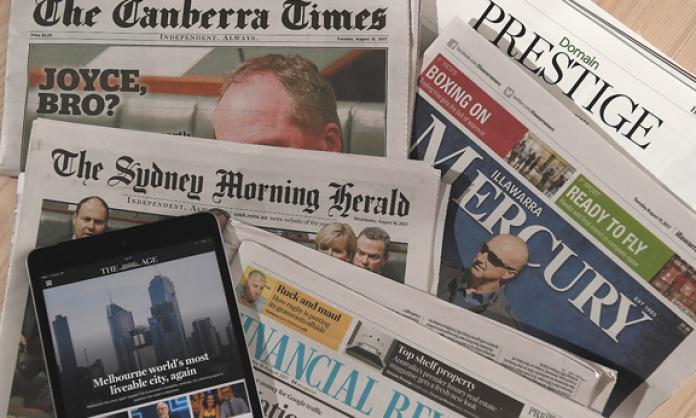Australia has for many years had one of the most monopolised media sectors in the world. Eighty percent of newspaper circulation in the capital cities is controlled by just two companies – NewsCorp, owned by Rupert Murdoch, and Fairfax. This means that print news consumption is almost entirely dominated by what these two companies determine is news and how they choose to present it. Among electronic media, three or four companies account for the vast majority of revenue from commercial radio, and the same is true for commercial television.
Media concentration is now about to get even worse thanks to the government’s changes to the Broadcasting Services Act, passed by the Senate in mid-September.
The main change is the scrapping of the “two out of three rule”, which stops companies owning newspapers and radio and television stations in the same city. The legislation also abolishes the “reach rule”, which prevents a single TV broadcaster from reaching more than 75 percent of the population. Abolition of this rule will lead to the closure of the remaining regional TV stations.
These changes come on top of the abolition of revenue-based television licence fees announced in the federal budget, which will give the big media companies about $130 million a year.
The result of these changes will be a frenzy of buy-ups as each media baron tries to come out on top. It’s a fight to the death: many players in the Australian media industry are bleeding money as Google and Facebook gobble up much of the advertising revenue the industry once took for granted. Newspaper circulation is in rapid decline, and the publishers rely increasingly on internet sites – realestate.com.au (Murdoch) and domain.com.au (Fairfax) – to turn a profit. Murdoch and Fairfax are looking to use abolition of the two out of three rule to put together multi-platform media syndicates that can survive in the new environment.
Rupert Murdoch is set to benefit the most. Murdoch already owns the tabloids in the three biggest capital cities, along with the Australian, Sky News, half of Foxtel, News Local (publisher of hundreds of suburban free newspapers) and the news.com.au website, one of the country’s most visited. Foxtel has recently been granted a $30 million government subsidy over four years to run more sports coverage. Now, with the abolition of the two out of three rule, Murdoch will be given the opportunity to buy a free to air TV network. In early September, Murdoch narrowly missed out on buying debt-stricken Channel Ten, as US broadcaster CBS beat him to it, but he will be sniffing around for another broadcaster to add to his stable. NewsCorp will also be in a position to absorb the Nova radio network, currently controlled by Lachlan Murdoch.
Fairfax, which owns the “quality” dailies, the Age, the Sydney Morning Herald and the Financial Review, a big swathe of regional newspapers and, with John Singleton, the Macquarie radio network, has been in talks with Channel Nine and Channel Seven with a view to a lash-up. Channel Seven is owned by Kerry Stokes’ Seven West Media, which, as well as running a national TV network, also owns Prime Media and now holds a seven-day monopoly on Perth’s print media.
The cherry on the cake for the big media companies is an inquiry by the Australian Competition and Consumer Commission into Google and Facebook, a provision included in the legislation on SA senator Nick Xenophon’s insistence. This inquiry won’t hold back the US behemoths forever, but it might give the local operators some breathing space while they work out how best to respond.
The concentration of electronic and print media into fewer and fewer hands is a direct threat to democracy because it provides the owners with the ability to influence the political process, not just once every three or four years, but every day. You only have to look at the influence of Murdoch on politics in Australia, Britain and the United States to see how this power is used to the detriment of the public at large and to the benefit, not just of Murdoch himself, but right wing political parties. Murdoch is not always successful; despite the best efforts of the Daily Telegraph, which runs hysterical anti-Labor coverage, the ALP gave the Coalition a nasty scare at last year’s federal election. But even if Murdoch does not win every time, he remains one of the most powerful figures in Australian politics and will now become even more so thanks to these ownership changes.
The cannibalisation of the media industry will also be bad news for those who work in it. Three thousand journalists have already lost their jobs since 2011 as companies do their best to protect their profits. The takeovers and closures that will follow the latest changes, along with the government starving the ABC of funds, will take out still more.









